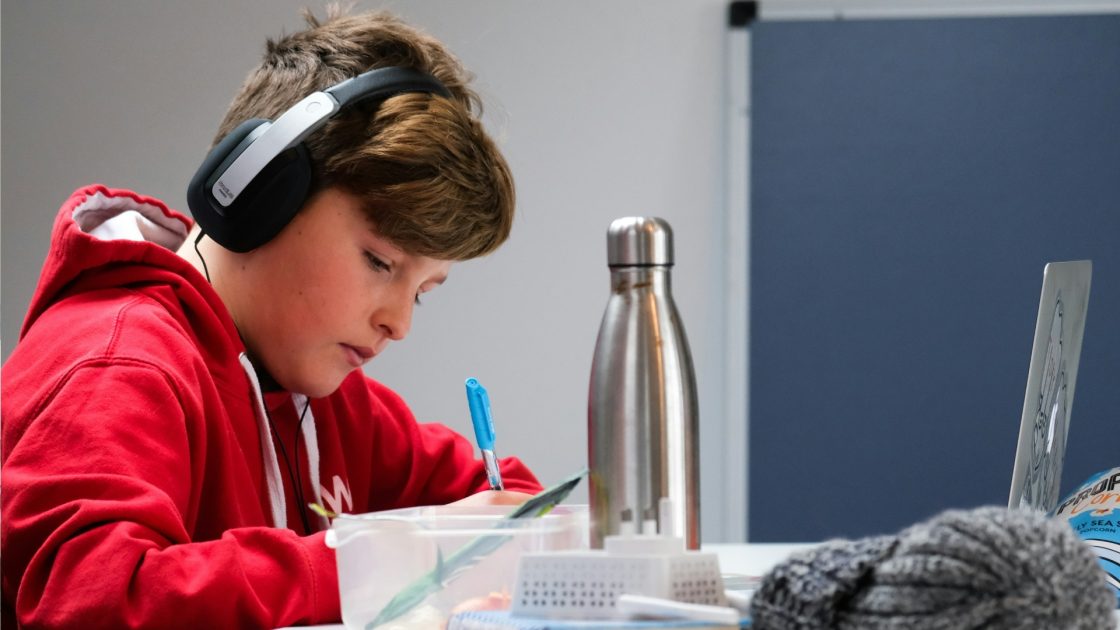Growing up undiagnosed and Autistic: What I wish schools knew
Charlie shares their journey to an autism diagnosis, reflecting on school struggles, self-discovery, and finding the right support to thrive.

TW // This piece discusses self-harm and suicide. Please look after yourself if you choose to read on. Our text support service details are listed below.
I was a good student. I loved to learn, and I enjoyed school, but when I started secondary school, everything changed. I watched my peers make friends, join clubs, and attend classes, and I wondered what was so wrong with me that I couldn’t do the same.
A tough day began in the morning, from the second I woke up. A feeling of dread would build in my stomach as I realised that I had to go to school, a place where I felt unsafe and invisible. I would put on my uniform, which felt like sandpaper against my skin and live on autopilot, hoping to survive the day.
Sensory overload and the need for support
I would get to school early so I could get to my locker without feeling people pressed against me and walk to class. I’d sit down and complete my little routine, laying out my pens and books in a way that would calm my racing mind.
Sometimes, I could get by like this, by playing with my hair, twirling my pen or doodling in the corners of my notebooks to self-soothe. I know now that I was stimming. But most of the time, one “little” thing would happen: the bell ringing, a chair squeaking against the floor, my safe food sold out in the canteen, and it would fall apart like I was carrying loose sheets of paper in a windstorm and they had all blown away.
Misunderstood and mislabeled: seeking help at school
My school didn’t have a sensory or quiet room and with no safe place to go, I’d hide in the bathroom for as long as possible until I could grab my things and head to the office.
Some days I would visit our guidance counsellor for help but she never could do much. Thinking back, I don’t think she had much experience with neurodivergent students, and unfortunately, I wasn’t given the care that I needed.
Other days, I would go to my year head, but I soon learned that she saw me as a problem child. I spent most of my days sitting outside her office alone, begging myself to calm down so that she wouldn’t look at me with that glare again. It never worked, and so she’d call my mam to pick me up.
Receiving my autism diagnosis
This cycle continued for a couple of months until it broke me down. My parents took me to the doctor for symptoms of depression and anxiety, who referred me to a psychiatrist who diagnosed me with autism. I knew nothing about what it meant to be autistic, and the research I did only led me to that done on little boys, and as a 13-year-old assigned female at birth, it only made me feel more alone.
I think for a while, I subconsciously didn’t accept that I had autism. The only representation of autism I saw was that of boys who were non-verbal and were either super-geniuses or aggressive, and I was neither, so that meant I wasn’t autistic, right? So, instead, I treated myself like I was a failure and a problem child. That I was just “made wrong”.
Struggling with self-acceptance and mental health
My main way of coping was through reading and daydreaming that I was in a faraway place, that I was a wizard or a superhero, and that’s why I never felt like I had a place in this world. I stopped living in the real world that caused me pain and lived entirely through the fantasies in my head. This disassociation helped me escape the pain for a while, but it got to a point where I was missing out on living my life.
I still like to daydream that I’m living in fantasy worlds sometimes, but I never let it take away from living. Life isn’t perfect sometimes, but that’s what makes it so beautiful. You don’t admire art for perfection, you admire it to feel.
Unfortunately, I also turned to self-harm to cope. I started cutting, but reflecting on that time in my life, I self-harmed in other ways too. I used to restrict my eating, I would purposefully not take part in hobbies I loved, and I would hang out with people who made me feel miserable to hurt myself.
I continued living like this for almost a year until “coping” with self-harm grew into a plan to take my own life. That’s when it hit me that things had to change because I had never wanted to die. I so desperately wanted to live without the pain of feeling different, but I didn’t know how to. The pandemic hit, so I worked from home and completed my Junior Cert with predicted grades. Once I had that under my belt, I chose to leave school. This was a very difficult decision to make, but I needed to prioritise my health before thinking about my education.
Finding a path to healing and self-acceptance
Feeling different made me feel alone, and I struggled to make and maintain friends. I felt misunderstood; my blunt replies often read as a lack of empathy despite being a highly empathetic person. I felt that I was falling behind, that I wasn’t meeting teenage milestones such as going to parties or hanging out with friends, and it damaged my self-esteem.
Finding the right therapist greatly helped me to come to terms with my autism, in particular through inner child work. I joined Youthreach to complete my education, which I found was a better fit for my needs, and I was able to form healthy friendships with my classmates. Hearing about other young people’s experiences with autism was also a great stepping stone in figuring out myself and, later, what helped me cope.
I wish that the school had a better understanding of autism and that they would’ve listened to my family and me when we told them what I needed as support. I also wish that autism representation in the media was better, both for myself and for my peers and that it was talked about more in school.
What I wish schools knew about autism
If I were to time travel and talk to my younger self, I’d tell them that I was never broken; I was just a book written in a language I had yet to learn. Self-discovery can be fun, and prioritising myself isn’t a bad thing. My mam always reminds me to take life one day at a time, and that way of thinking has made living so much easier. I’ve made peace with myself, and even on my tough days, I can finally live without feeling that I’m “broken”.
Feeling overwhelmed and want to talk to someone?
- Get anonymous support 24/7 with our text message support service
- Connect with a trained volunteer who will listen to you, and help you to move forward feeling better
- Whatsapp us now or free-text SPUNOUT to 50808 to begin.
- Find out more about our text message support service
If you are a customer of the 48 or An Post network or cannot get through using the ‘50808’ short code please text HELLO to 086 1800 280 (standard message rates may apply). Some smaller networks do not support short codes like ‘50808’.






